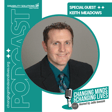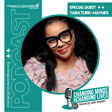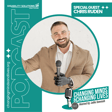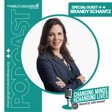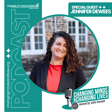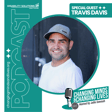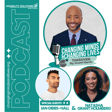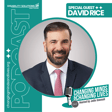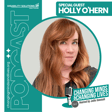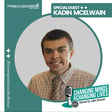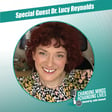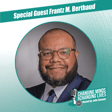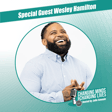Introduction and Mission of Disability Solutions
00:00:00
Speaker
Welcome to the Changing Minds, Changing Lives podcast. Welcome back. My name is Julie Sowash. I'm the executive director and co-founder of Disability Solutions. We are a nonprofit based out of the United States that work with companies around the world to help them figure out how to meet people with disabilities where they are.
00:00:21
Speaker
hire them, retain them, and grow them within their organizations. This podcast is about changing minds and changing lives for our community. And I hope if this is the first time you are logging in and checking out either via YouTube or via your favorite ah podcast player like Spotify or Apple um that you check out some of our previous episodes. We've had some incredible interviews and we're going to have some more and another one today. um I want to welcome to the show today Callum Grevers, who is a disability and inclusion consultant, a public speaker,
00:00:59
Speaker
a policy researcher, a disability campaigner, who is also joining us today from Edinburgh, Scotland, which I just got to visit. We had a chance to talk about. So Callum, thank you for joining Changing Minds, Changing Lives
Callum Grevers' Personal Journey and Challenges
00:01:15
Speaker
today. Thank you. oh So talk about, or just tell us a little bit about Callum. Right. so m Before, I want to piece this with talking about disability. and So I have muscular dystrophy. I use a wheelchair. And and basically, I kind of discover my passion for
00:01:39
Speaker
using consciousness of disability es issues and ableism from a campaign that started. So I think back in 2019, I was living my parents' home, which wasn't accessible. And this was kind of affecting my mental health, my career prospects. And I think when you're in an unstable housing situation it affects most aspects of your life and so basically what happened was I applied for social housing or public housing for American audiences m and basically what happened was I was put on this waiting list and
00:02:24
Speaker
and i was told I had to wait for a needs assessment, even though the local authority has plenty of information about my condition, about my situation from social work, from NHS, from other institutions. But basically I had to wait for a needs assessment. That was cancelled because of the pandemic for an indefinite amount of time.
00:02:50
Speaker
and And I did a bit of research about how long I would expect to wait. And there was a Freedom Information request. And so the average waiting time was about three years for an accessible platform to see on people. And I would say with the pandemic, it was a huge backlog. Demand was increasingly because of the economic impact. um These assessments had stopped. So basically it was going to look like maybe five years before I could live independently and grow my career and basically just take my life to the next at stage. So I'm like, I don't really know what to do.
00:03:39
Speaker
there was like no real options. So my friends and family suggested I start a current funding campaign, but I was like, I don't really want to perpetuate the narratives that disabled people should depend on charity and distract from kind of like the societal and sustained barriers are pretty mean in the situation.
00:04:05
Speaker
and So I kind of thought about how can I balance fundraising for myself with raising awareness of issues in housing, other barriers to see what people face. and Just to make it not just about me, because I don't want to feel like I'm kind of utilising people's assumption that to see what people should rely on charity, but So I kind of tried to balance those two things. I wouldn't say it always worked perfectly. I did get the raise awareness of the issues. That definitely was successful. But sometimes you work with the media, they're very like, they're trying to fit you into these old disability narratives, whether that's inspiration or tragedy or charity.
Success in Fundraising and Meeting with Government
00:04:58
Speaker
And I think when you do these,
00:05:00
Speaker
TV interviews, for instance. The ads tip to the point that emphasizes these stereotypes. It doesn't give you the nuance or the, and it kind of just reflects what the audience already believes, if you know what I mean. So it was kind of like a difficult link to balance. But in the end, I was successful. I raised £55,000.
00:05:25
Speaker
and an accessible flat basically allowed me to kind of purchase a quarter share of a flat and basically appeal or rent on the rest of the plates. Fully accessible and I think once I succeeded I met with the Scottish Government to talk about housing policy. I felt it was very much a tokenistic gesture really because obviously I've been in the media a lot they kind of wanted to maybe just
00:05:58
Speaker
make me quiet, I guess. I don't feel like I didn't secure the kind of meaningful change. I did make a lot of people aware.
Awareness, Social Media, and New Career Path
00:06:10
Speaker
A lot of people came to me and said I had changed their knowledge and attitude completely to accessibility and disability, but the system didn't really change.
00:06:23
Speaker
But that's not to say, obviously, I achieved my goal. And I think I also proved to myself what's possible as an individual campaigner. And kind of like I built a huge network of people out of it on social media. And now with that, I kind of started a career as a disability consultant m and kind of life grew from there.
00:06:49
Speaker
um It's changed quite a lot. um In terms of the confidence, my potential, I feel feel like the same person as I was five years ago. wow But one thing I would say is I also learned that you have to manage burnout and stuff like that. Because when you're campaigning as an individual, for I think it was about two years. And and after that, yeah, I kind of have to
00:07:19
Speaker
know how to manage. I don't think I managed it as I could. So I think the campaign stopped after after that and then I focused on my career.
00:07:34
Speaker
right Um, well, thank you for sharing that. I mean, that's quite a, that's quite a journey. So, and there's quite a bit that I want to kind of unpack with you if you don't mind. Um, so basically if, and for, I think our American listeners.
Challenges of Accessible Housing in the UK
00:07:53
Speaker
kind of also have some assumption about most buildings being accessible for people with mobility challenges and those kind of things, which is not true in America, but in Europe and and the UK where buildings are substantially older um and were built in sometimes completely different centuries, um accessibility is a huge issue.
00:08:19
Speaker
especially for someone who uses a ah wheelchair and so you were a young guy you still look like a pretty young guy to me ready to get out start his career do his thing um and.
00:08:33
Speaker
What you found is not only was accessible housing not readily available, but then social housing with that was also accessible was going to be basically five plus years out for you. Is that right?
00:08:51
Speaker
Yeah, based on them the freedom of origin request that said the average waiting time, that was before the pandemic, that the average waiting time was two years. So when you think about the demand increasing by people who maybe lost their jobs through the pandemic or weren't earning enough, they might go towards social housing solutions. But it also means that home visits for needs assessments and stopped because you weren't able to visit people's homes because of the risk of spreading COVID. um close And the pandemic went on what, two years? So, fetching that in, and that's kind of what my
00:09:41
Speaker
Impression was, they did actually, once I moved out, they asked me to do any success, not knowing that I had come off the meeting list. And that was after, think I think that was in 2022, even when my campaign started in, like, start in 2020, I think. Yeah. There's a lot of issues in the allocation system.
00:10:09
Speaker
and And obviously, this information could be passed from another department, but there isn't enough communication or centralization between different areas. So they just repeat work. Yes. I've met social workers in the past. They have information about my situation, my disability, about it's all there already. So they can really streamline that process. And I think Why do you think they don't streamline that process? Or what did you learn when you met with government officials about why this wasn't a priority?
Impact of Government Policies and Inaccessibility
00:10:52
Speaker
Well, we do tell you things like there is accessibility requirements. There is regulations there. But for me, I think the issue is that because of cuts from 2010 to the camera's government,
00:11:09
Speaker
and Google authorities can't challenge developers in court if they don't follow regulations. They don't have the funds to be able to do that. and And I think they have a requirement of a certain proportion to be accessible. But it's not high enough proportion. Because we think about there's an aging population.
00:11:40
Speaker
And obviously people age, so you develop disabilities and it's better for them if we can stay in their own home. It's better for their physical health or mental health. And also we'll think about what's the impact of a society where disabled people cannot enter your body's people's homes. It's a kind of form of segregation almost, so last year's won't improve. and It limits what's possible for and sale parsel a in terms of their life, their development of their life. and But basically, I was kind of told that these are the things they're doing. It wasn't really enough. I didn't feel they were really engaging.
00:12:31
Speaker
They come out where they're pretty set responses. fair so They're politician responses. yeah um not you know i like I don't like, but I think something that you said just said is really important is that you know when people with certain types of disabilities can't fully interact with any environment, it is ah it is a form of segregation. And I've not heard it said quite that eloquently. And I think that that's something that really can hit home with our listeners. Yeah, I think like obviously in terms of making friends, in terms of forming relationships, it's kind of very limiting in terms of the people you can interact with. And I kind of I think it makes
00:13:23
Speaker
It's not just the radiation, but it kind of makes the real one visible. You don't see them in games to your life if they are visible wherever they go isn't accessible, if their rooms aren't accessible. So it gives people a wrong impression of what the serial can do, what the potential is. You just see it as this is the way it is. And I think The best way to the interaction of your body people and see your people. I think that's all it is matters. Yeah, I mean that just everyday interaction goes a long way. I love that.
00:14:08
Speaker
um okay so you we're like, hey, I'm not gonna be able to get into the social housing. So I've got to take action for myself, which again, I also love a couple of things that you said. One, you said, I have to be proactive. I have to figure out how to change my situation in the best way that I can. um And then the other thing that you said that I think I just truly appreciated um was that you wanted to make a good balance between
00:14:43
Speaker
I have needs and I need help with those needs, not because I'm a person with a disability, but because I'm a human who has needs um and not reinforcing stereotypes through your own messaging, I think is what you said, that people with disabilities should only be viewed as charity.
Breaking Stereotypes and Internalized Ableism
00:15:07
Speaker
Can you talk a little more about that? Well, I made sure that I emphasized that barriers were put to me in the situation that I was having to crowdfund to remove those barriers. But it was always kind of clear that, you know, it shouldn't be like this. ah soon after I crowdfund to find accessible social housing. And if I was focusing on, you know, this is my like can condition I have, the needs I have,
00:15:40
Speaker
Sometimes I felt like I was doing disservice to all the work disabled lives we've done to remove barriers and increase government support, things like that. ah m So that's why I wanted to balance it. But I think that was a wee bit of
00:16:02
Speaker
ah either been trying to not ask for help. And there's nothing wrong with asking for help because everybody needs help with something. And so I think that was more of a feeder I had, but it didn't play out again in reality. and Yeah. Yeah. I think, I mean, I think that's ah just, again, just such ah an elegant point you so often, and and I live with mental illness, which is completely different than than your disability, but for a long time, I was afraid to ask for help because I thought I needed to be able to fix it myself, that there was something innately wrong with me not being able to work, to get my mind to work the way that I needed it to. And, you know, we have sort of an internalized ableism with ourselves because,
00:16:56
Speaker
Why isn't everything built for me the way that I need for it to be built? And we almost put that guilt on ourselves. And I you know i really appreciate your transparency in that part of the conversation, because I think, again, people who are not disabled need to hear frank conversations from people with disabilities about um how we feel, you know that we want to have that same basic pride of living and engaging and you know going to work day in and day out, just like everyone else does. um But sometimes the environment isn't built in a way that we can function with um and you know that it. that it almost
00:17:43
Speaker
hampered you in asking for the help that you needed, but ultimately driving towards the the dream and the self independence and now the productivity um that you bring to the community. I think, Kim, you touched on a quite important point there is with internalized ableism, it's you're given, you kind of absorb this from able-bodied people, from the media, from just people around you that It's something you have to hide and never burden anyone else with by asking for help. But people don't respond in that way. You assume people are more willing to help or then you assume and you're not really a burden on others. So I think it takes many years to actually unravel all this internalized ableism and kind of just be yourself willing to ask for help and
00:18:43
Speaker
not behind any aspect of yourself because of other people's attitudes. And and it's I think it's quite pernicious really, especially in the early stages of your life, if you're born with a disability. and Because I'm 31.
00:19:02
Speaker
when I was growing up or in high school, most of that time social media didn't exist. And I think I wasn't so exposed to positive role models or authentic narratives. and Because in the media, representation has improved a bit for people with disabilities, but it's still a long way than it is for other marginalized groups.
00:19:30
Speaker
and So you get a complete wrong impression of who you are, what was possible for you. And it kind of never really fully leaves you that attitude. It's always something you have to push away at the back of your mind telling you that you don't deserve the support you're asking for. don't You you're burdening other people and all this, but you always have to kind of push that away, I think.
00:20:01
Speaker
Yeah, I mean, and that's, again, such a, such a great point. And, you know, something I've been talking about and you, you just mentioned is I really feel.
Role of Social Media and Community Support
00:20:12
Speaker
not in not in every way, but in a lot of ways, social media has been such a positive um driver for people with all types of disabilities because we have social circles and and people that we can see and connect with that are living lives like we're living um and and going about their daily business. and that's not just good for
00:20:39
Speaker
us as a community to have that and to build that that sense of community, but it's really important for people without disabilities to see um as a part of exposure to their everyday lives. Yeah, I think and one aspect of this is the kind of, like I grew up not knowing any other disabled people. There was only one in my class at school, or no school in fact. and so And also, because of this internalised ableism, you're kind of like, as bad as it sounds, you don't want to associate yourself with other people going through similar other things. So it's like, it destroys that sense of community with all the two people. a And obviously that's kind of, that camaraderie is quite
00:21:31
Speaker
useful in terms of your mental health, in terms of speaking up when you face injustice. So I think that's kind of a big aspect of it. So it wasn't until much later in life that I was connected with the disability community and I saw disability as result of barriers in society as opposed to something wrong with me as a person, something failure of some kind. And and once I kind of saw it as a kind of identity, as a diverse community, that's when things really kind of changed in my life and I realized that so much more is possible than we thought.
00:22:19
Speaker
but When you do that, you kind of get the sense that you have to compensate for lost time because all of all the things you didn't experience when you were younger because you had kind of corrupted attitude to yourself and to disability. So you've got some some living and catching up to do is what I'm hearing. Yeah. How's it feeling? Yeah.
00:22:45
Speaker
As, um, sorry. Um, and now we kind of fast forward. You have now an apartment in Edinburgh still that is accessible. Um, and you are now in the world of disability and inclusion
Career in Consultancy and Balancing Activism
00:23:02
Speaker
consultancy. So tell me a little bit about this business that you've started, what some of your goals are and and some of the work that you are doing and want to do. So basically it kind of started by accident. I was, um,
00:23:16
Speaker
After building up this big network of social media, I wrote a post about the barriers I faced to work and but why my career is not where I'd like it to be and because of barriers in the benefit system, a and of employers, stuff like that. And basically that post went viral. And as a result, I was offered this kind of freelance opportunity. It was within It was a kind of university research project about support people with health conditions, into employment, about the kind of workplace policies and current policies that we changed. So that was kind of my entry way in, just from that post. And since then I've picked up various kind of freelance work, some of it's disability inclusion training, some of it's and
00:24:15
Speaker
So it's kind of a general consultancy, some public speaking. It's kind of a varied curial playlist, fell into it by accident. So it's interesting the way it works.
00:24:30
Speaker
and yeah So is this, um, is this kind of the, is this what you see kind of going forward for you in the future is, is really, um, growing your advocacy as well as your consultancy, not just around employment, but potentially just around the the societal barriers to, to full inclusion. Yeah. And I think it's about building a career that everybody issues that affect me personally. So I'll have that passion for it, but it's also about making it
00:25:03
Speaker
financially viable. Just kind of finding that balance of activism and kind of working within within the system and and for organisations just trying to prove to see if we was licensed in a way. and So I find it quite rewarding, it's quite fulfilling, but at the same time you can't live and breathe disability stuff because it's not always good for your mental health long term. So it's still something we're trying to work with like to manage that. Yeah. and It's a lifetime's worth of work, right? And sometimes it's it's really emotionally exhausting work. So this has been such a fun conversation.
Benefits of Inclusion and Gratitude for Support
00:25:50
Speaker
I've learned and thought about things
00:25:53
Speaker
in ways that I haven't before. So I want to thank you for that. um As you know, we always end the podcast with two questions. um And so the first one is, what is one thing that you would tell someone in leadership ah that would help change their minds about what people with disabilities bring to the table? Well, I think for us to emphasize that the kind of social benefits of a includes real estate people. It isn't just about enabling me to do to do more. I think to say we have so much to contribute to workplaces to think about. and Like my lived experience is as valuable as my work experience. and So like, for example, to see people live in a world that's not built for them.
00:26:51
Speaker
So as a result, it makes us creative. It makes us good at challenging old ways of doing things, always thinking of how someone could make better or find a new way of doing something. and And our perspectives are different from your body people. So I think when you have diverse perspectives that improve decision making,
00:27:19
Speaker
and It makes you work harder to achieve consensus. And I think even just a kind of knowledge of disability and access. So the disability market globally is worth $13 trillion. We include disabled friends and family members. and So obviously, it's a good for an organization's profitability. Just trying to look.
00:27:52
Speaker
look at the bigger a picture when it comes to access. It's not just about me. and For example, all the, there's this idea that accommodations are too expensive. and But in reality, according to the Disability Business Forum, the average accommodation costs 75 pounds and someone costs nothing, for like working from home.
00:28:21
Speaker
But we already have the resources. and So there's always myths about what it And it needs to be seen as an investment, not an expenditure. Because that's really what it is at the end of the day. An investment, not an expenditure. I love that. And what is one thing that someone has done for you that's helped change your life?
00:28:51
Speaker
Well, I would say express my gratitude to all the people who donated to my campaign. I think it was about 2,000 people at the end of the day. I was by how much people engaged in the campaign were keen to learn about about accessible housing and stuff.
00:29:16
Speaker
um So I just say thank you to all of them for kind of not just helping me move out, but also supporting my career and kind of giving the opportunity to give something back through my campaigning as well. Amazing. So if someone who is listening or watching right now wants to engage with you, Callum, where can we find you? It's very on LinkedIn. I recently started Instagram as well where I talk about
00:29:48
Speaker
more personal with experiences and stuff like that. And with my consultancy work and public speaking, you can see that on LinkedIn mostly. Great. Wonderful. Callen Revers, thank you so much for the work that you're doing in our community. Thank you for joining us. And thank you guys for joining us for another episode of Changing Minds and Changing Lives. We'll catch up soon. Bye. Thanks for having me. Bye.

